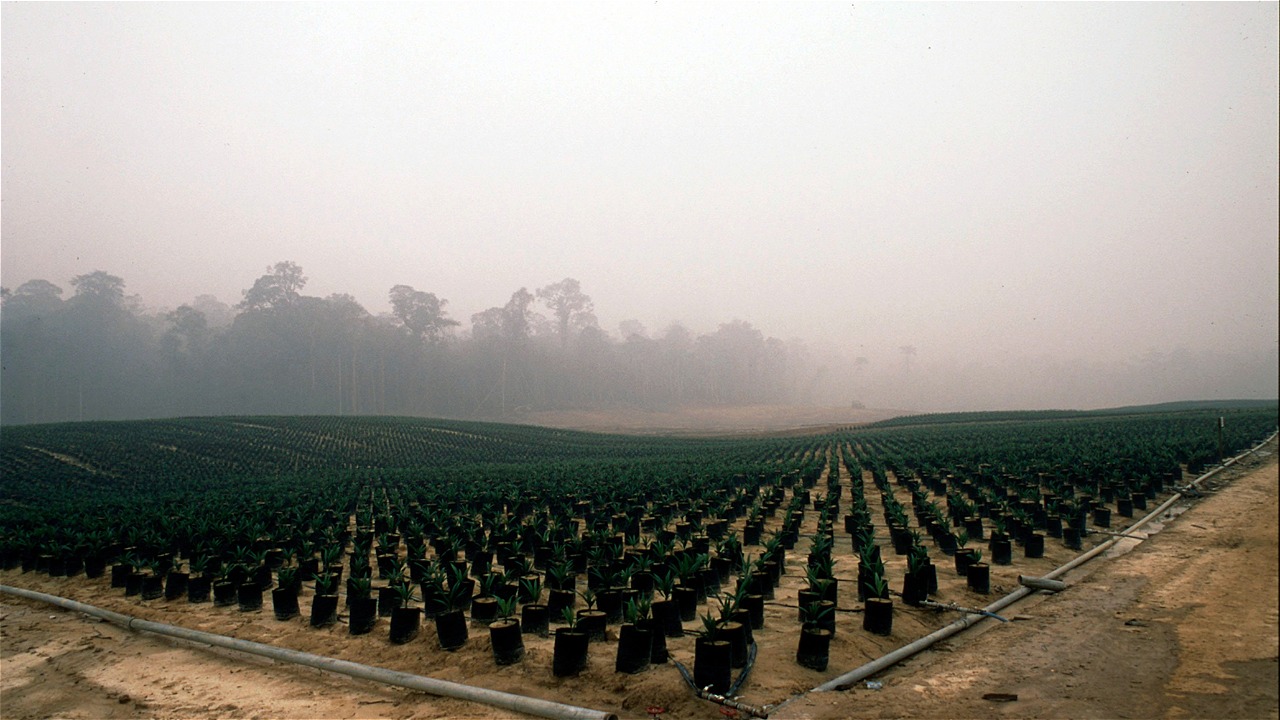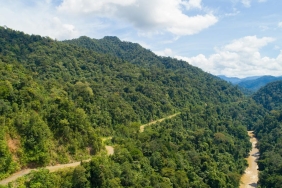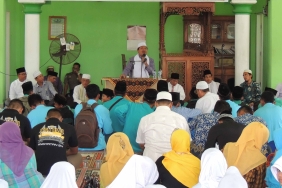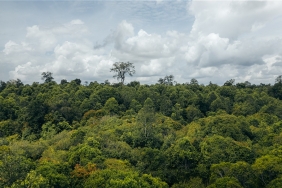CUKUP SUDAH: AFTER EIGHT YEARS OF "ZERO DEFORESTATION" PROMISES, THE PALM OIL INDUSTRY IS STILL DESTROYING FORESTS
PEKANBARU - Palm fruit from plantations that were unprocedurally or illegally developed within Forest Estate and including conservation areas that are habitats for endangered wildlife continue to contaminate the palm oil entering the supply chains of 24 global traders and brands, despite their zero deforestation commitments. This is the finding of an Eyes on the Forest (EoF) report published today. Protected areas have been lost to oil palm including some of the last habitats of Indonesia's critically endangered Sumatran elephants and tigers.
EoF's randomized chains-of-custody investigations since 2011 found 22 palm oil mills buying illegal fresh fruit bunches (FFB) harvested in two High Conservation Value Areas in central Sumatra, in the Tesso Nilo and Bukit Tigapuluh landscapes. EoF found that, let's call them the Big 4: GAR, Musim Mas, RGE and Wilmar - have been buying illegal FFB from these mills, often repeatedly, even though they have known about this from previous EoF reports.
Palm mills are also among the many direct or indirect suppliers of the world's major palm oil traders and users that have zero deforestation commitments as found by EoF investigations, namely: AAK, ADM, Bunge, Cargill, Colgate- Palmolive, Fuji Oil, General Mills, Kellogg's, Louis Dreyfus, Mars, Mondelēz, Neste, Nestlé, Olam, PepsiCo, Proctor & Gamble, Reckitt Benckiser, Sime Darby and Unilever. The report findings were shown to the companies prior to publication.
""EoF applauds the transparency of all these companies to start publishing data on their supplier mills and we urge others to follow suit,"" said Nursamsu, WWF-Indonesia Deforestation Monitoring and Advocacy Leader. ""We are not surprised to find many companies implicated, as we know the scale of illegality in these landscapes and how local players, including the Big 4, operate.
EoF expects that the linkage of well-known names in the palm oil industry, will be able to take significant action to use their purchasing power and brand recognition as a strong position to clean up their downstream supply. And reversing the deforestation footprint. ""We need their help to stop the imminent destruction of biodiversity-rich tropical forests,"" Nursamsu added.
EoF believes its study identified only the tip of the iceberg. We believe the report details a picture of widespread illegality in the palm oil sector in central Sumatra as a whole, not just in the two landscapes highlighted. Central Sumatra is ground zero for the worst deforestation on the island, which alone is a global hotspot for deforestation. EoF found trucks carrying illegal fresh fruit bunches (FFB) traveled 145 kilometers and spent over 5 days on the road. Long enough to reach 200 CPO mills, the roads extend beyond district and provincial boundaries from their origin in Tesso Nilo National Park. The latest report proves the assumption of our 2016 report that no one is safe from buying palm oil mixed with illegality and deforestation. Moreover, without mill-level purchase screening, it is easy to use illegally grown FFB in many priority conservation areas, contaminating even more global companies' supply chains.
The Eyes on the Forest report Cukup Sudah highlights the importance of tracing all palm oil supplies all the way to the plantation. However, data collected from the Big 4 on their FFB traceability, shows that a large amount of FFB processed into palm oil within their supply chains, still comes from unknown sources.
""Without recognizing the real source, how can people feel 100% safe and they will not buy products mixed with illegal FFB?"" said Woro Supartinah, Coordinator of Jikalahari. ""The Big 4 have understood the widespread violations in the region for a long time, but they still put their priority on securing enough FFB supply to fill the demand of downstream facilities. And this relies heavily on unreliable supplies from third-party plantations, agents and traders. Considering the huge responsibility that they have to protect their downstream customers, they have clearly failed to do their best to address this issue.""
The lack of a robust FFB traceability methodology also means it will be impossible for any company to deliver on its commitment to halt deforestation, as there is no way to find out whether FFB harvested from plantations has been planted after deforestation. ""Does the industry want to be remembered for one hand destroying Tesso Nilo National Park into palm oil plantations and causing the extinction of Sumatran tigers in Tesso Nilo while having a zero deforestation policy?"" asked Riko Kurniawan, Executive Director of WALHI Riau.
""Despite years of commitment, the industry is still entangled in forest conversion to palm oil. Enough is enough,"" said Diki Kurniawan of WARSI, an EoF network member in Sumatra. ""In the eighth year since the first 'zero deforestation' policy, there is still urgency for industry and civil society to review all supply chain work and actual achievements on the ground. So as to direct future efforts towards the true goal of the zero deforestation commitment: stopping the destruction in areas like Tesso Nilo and Bukit Tigapuluh. And begin the work of reversing this deforestation footprint.""
""Lack of governance and law enforcement in the past has contributed to large-scale encroachment of protected forests into oil palm development. Since we published our last report, the Minister of Environment and Forestry has established the Tesso Nilo Ecosystem Revitalization task force,"" said Woro Supartinah.
""We will continue our investigation in support of the RETN team's goal that palm oil mills stop buying FFB from illegal plantations in the Tesso Nilo ecosystem. We also hope that the Big 4 and other companies can support the Minister's efforts by working with their upstream suppliers to achieve 100% FFB traceability as soon as possible. So that FFB produced or harvested illegally and unsustainably can be identified, segregated and removed."" The EoF coalition calls on the palm oil industry and its users to comply with the Riau Police's appeal and the MoEF's policy to not indiscriminately buy FFB in the Tesso Nilo landscape where around 58 mills were warned by the police about this on February 17, 2017.
Diki Kurniawan said, ""following the good example of Tesso Nilo, the local government, security forces, companies, CSOs and communities have just formed the Bukit Tigapuluh team in Tebo district to save and restore the Bukit Tigapuluh landscape,"" Diki Kurniawan added. ""We strongly urge companies to support the efforts by the RETN and Bukit Tigapuluh team through significant contributions to address their deforestation legacy and start protecting and restoring conservation areas such as Tesso Nilo and Bukit Tigapuluh. It is unacceptable for any industry to jeopardize regional efforts for conservation.""
For more information please contact:.
- Woro Supartinah, Jikalahari / sekretariat@jikalahari.or.id / +62 813 1756 6965
- Riko Kurniawan, WALHI Riau / rikokurniawan@walhi.or.id / +62 813 7130 2269
- Nursamsu, WWF-Indonesia / nursamsu@wwf.id / +62 811 7582 217
Note to the Editor:
- The latest report is published at: www.eyesontheforest.or.id/reports
- EoF (and WWF-Indonesia) previously published reports based on investigations into the illegal FFB trade from two landscapes:
- Nothing is safe (2016): http://eyesontheforest.or.id/uploads/default/report/Eyes-on-the-Forest-Laporan-Investigatif-Tak-ada-yang-aman-April-2016.pdf
- Tiger in your tank? (2014) http://eyesontheforest.or.id/uploads/default/report/Eyes-on-the-Forest-Laporan-Investigatif-Harimau-di-dalam-tangki-mobil-anda-September-2014.pdf
- Unraveling the Palm Oil Problem in Tesso Nilo National Park (2013) http://wwf.or.id/?28680/Addressing-the-encroachment-problem--in-Tesso-Nilo-National-Park
About EoF
Eyes on the Forest (EoF) is a coalition of NGOs in Riau, Sumatra: WALHI Riau, JikalahariRiau Forest Rescue Working Network" and WWF-Indonesia Central Sumatra Program. EoF also established a network of member groups in Sumatra (KKI Warsi) and Kalimantan: Environmental Law Clinic, Lembaga Gemawan, JARI Indonesia West Borneo, Kontak Rakyat Borneo, POINT, Swandiri Institute, Yayasan Titian, Gapeta Borneo and WWF-Indonesia Program West Kalimantan. EoF monitors deforestation and the status of remaining natural forests in Sumatra and Kalimantan and disseminates information widely.
For more information about Eyes on the Forest, please visit:
EoF website: EoF website: http://www.eyesontheforest.or.id
EoF interactive map: http://maps.eyesontheforest.or.id
Email: editor@eyesontheforest.or.id





